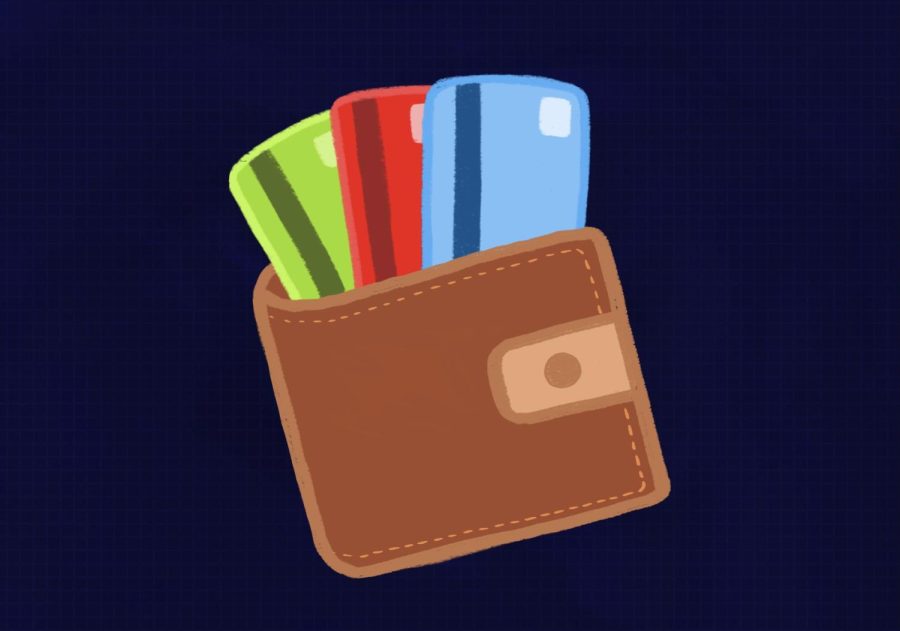Students navigate turbulent credit environment amid soaring interest rates
December 10, 2022
Difficulties may increase for students graduating with credit card debt, as the Federal Reserve prepares for another interest rate hike in December that will affect their next billing cycle.
The Federal Reserve increased rates by 75 basis points for a third consecutive time in November, while its federal funds rate rests between 3.75% and 4%.
The economic climate would affect student credit, since each 25-basis-point increase in the Fed’s standard interest rate renders an additional $25 a year in interest on $10,000 in debt. That means the most recent 75-basis-point hike adds up an added $75 of interest for every $10,000 in debt.
While interest on student loans are high, students taking new private loans should get ready to pay more as rates increase.
Credit cards have benefits over debit cards. A secure credit card helps students prepare and budget for their financial goals.
Carrying a balance and paying interest is a detriment to one’s financial health, especially while inflation is high. Responsible cardholders are also rewarded.
Kenneth Fernandez, a Baruch College alumnus and credit analyst at S&P Global, owns a credit card with JetBlue Airways Corp. As someone who likes to travel, he uses his card to earn reward points and free flights.
“You can also earn 3X JetBlue points if you enroll in JetBlue’s True Dining Program, and you can automatically earn points when eating out or ordering in at a restaurant,” Fernandez told The Ticker. “If students are responsible spenders, a credit card is recommended for them.”
He suggested not owning multiple credit cards just to use all of the available credit, saying that students “will be paying much higher interest rates right now.”
Inflation does not have a direct impact on student credit card applications, as eligibility is based on a student’s credit history and income level. But it would have an indirect impact in terms of students’ credit limit as things become more expensive.
A potential credit limit encourages students to spend less, thus their credit limit will shrink.
“If students are responsible with their credit cards from early on, not only do they get to build their credit,” Qiuping Zhang, an adjunct professor at Baruch’s Bert W. Wasserman Department of Economics and Finance, told The Ticker. “A high credit means they are a less risky borrower. So, when they purchase a house or a car in the future, where you likely can’t pay for it all at once, they will get better terms when borrowing the money. Hence, I recommend students to apply for credit cards but be responsible especially when inflation is at an all-time high.”
Students are encouraged to develop good credit card spending habits early on in their college careers.
William Hudelmaier, a Baruch alumnus and financial services advisor at Independent Financial Solutions, suggested that students compare potential fees and rates. He recommended acquiring a credit card with Discover since it offers no annual fees, offers 5% cash back and no annual percentage rate on purchases.
If a student makes “a large purchase like a computer, they can repay it within the time with zero interest,” Hudelmaier told The Ticker. “It is great for college students to build credit and earn 5% on daily purchases like grocery stores. Discover pairs all the cash back they earned at the end of the first year, so it is easy to earn $100 from a cash back of $50.”
Additionally, the Fed’s interest rate hike does not directly impact student loans because its cost is based on individual needs. If students applied for a fixed bowing rate last year, there would be no impact. But if they applied for a student loan with variable borrowing rate, it would be impacted because the rates will be higher.
Students will have to pay more in interest now, which would lead to higher payment later to repay the loan. If one has a stable income, it is suggested that they look for a card with an interest rate that is not intense, pay on time and keep the balance at a minimum to show trustworthy history to their future creditors.







